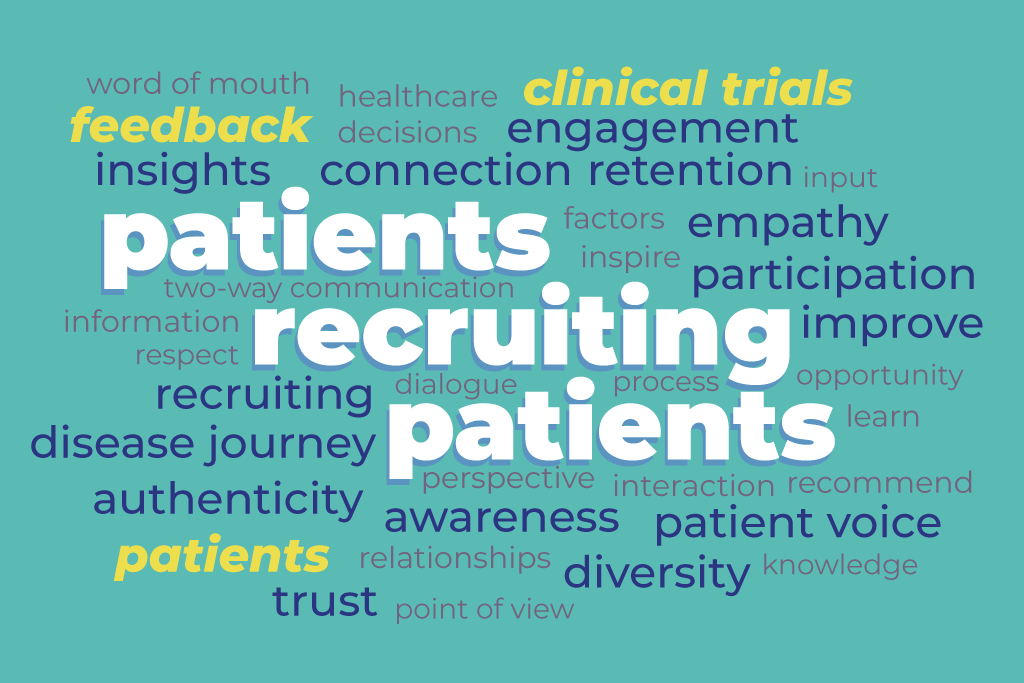By: Clinical Partnerships Team
Once a promising new drug candidate reaches the clinic, many R&D challenges have already been overcome. But the goal of the clinical trial process to produce quality data brings a new set of challenges. The process of enrolling patients—finding not only the number of patients needed to participate, but the right patients, who fit the study criteria, will complete the protocol and provide crucial diversity to ensure broadly applicable results—can derail even the most high-profile trial.
There are a number of ways patients themselves can assist with these challenges, if given the chance. Connecting these patients with biopharma companies is part of our core mission to elevate the patient voice. We frequently survey large groups of patients about clinical trial participation among people with a range of diseases, asking about their knowledge of and experience with clinical trials and, ultimately, their feelings about participating in them. The findings shine the spotlight on their willingness to participate in trials and what they can contribute beyond their role as study enrollee, as well as how to most effectively find and communicate with them.
We’ll share survey results from several surveys, along with other research on these topics and ways to engage with patients throughout the clinical trial process, in a series of three blogs. Read Blog #2: https://reverba.com/building-connections-for-clinical-trials-how-patients-can-improve-trial-enrollment-engagement-2/
Part 1 of 3: Sharing experiences for recruitment
In this first blog, we’ll examine the role patients can play in assisting other patients who are considering participating in a trial.
Consumers today are asked to make increasingly complex decisions around their healthcare. They have access to so much information, yet the level of detail and potential for confusion is only increasing. In the 24/7 stream of constant information on multiple channels and topics, how can they even learn about a clinical trial?
We recommend engaging other patients to tell them. Research shows that consumers have a high level of trust in information they get from people like them.
According to Nielsen, in its global Trust in Advertising Study, which surveyed 40,000 people across 56 countries, 88% of consumers said that they trusted recommendations from people they know, above all other forms of marketing messaging.(1) In addition to those they know, people also trust others with similar characteristics, such as the same disease – called their “in-group.” A research paper on “The Influence of Similarity and Mimicry on Decisions to Trust” in Collabra: Psychology says people may use the degree to which they perceive themselves to be similar to a person when making trust-based decisions.(2) And a meta-analysis on how and why humans trust published in Frontiers in Psychology in 2023 describes this human tendency – social identification with in-groups can contribute to biases in perceptions of trustworthiness and guide trust in others.(3)
This creates an untapped opportunity for clinical development teams to have patients help other patients with the same disease learn about, consider and decide whether to participate in a clinical trial.
To gain more insight into this opportunity, we conducted a survey in 2023 of more than 400 people, asking them about their knowledge of and experiences with clinical trials. The survey explored the opinions of people who have and have not participated in a trial, cross-referencing their reasons for making participation decisions, as well as their preferred methods of communication about trials.
First, we asked patients who have participated in a clinical trial about their motivations and why they decided to participate. The results show that more than one-third (32%) of patients chose to enroll in clinical trials with the greater good in mind: to help others and advance research.
Next, we asked clinical trial participants to rate their experience in the trial. The survey showed that 85% of patients rated their experience in the trial as “somewhat” or “very” positive.
When we asked patients who had not participated in a trial why they had not, 76% were not aware of any clinical trials related to their condition, but 60% said they were ‘very’ or ‘extremely’ likely to participate if given the opportunity. Significantly, 74% reported they would be more likely to participate if they could speak to a mentor with clinical trial experience.
In another similar survey we conducted earlier with 300 patients, 61% said they were “very likely” to recommend that a friend or family member participate in a trial, and another 23% were “somewhat likely” to make this recommendation — for a total of 84%.
In this earlier survey, we also asked how those who had chosen to participate in a clinical trial how they found out about their trial. Most (34%) found out about the trial from their doctor, and 26% found the trial through an advertisement. Only 2% heard about the clinical trial from another patient.
So based on our surveys, we discovered patients are inspired to help others, motivated to advance research, and report positive experiences in clinical trials. They are not only willing to go through the process again, but also are overwhelmingly willing to recommend that their friends and family participate in a trial. Yet almost none of them heard about a trial from another patient.
Engaging patients to assist with recruitment has another added benefit: helping increase diversity in trial enrollment. This is a priority for drug developers, as evidenced by new FDA guidelines and requirements announced in June.(4)
Research and advocacy groups know that patients have an important role to play in spreading the word about clinical trial participation, and many have developed programs to connect patients with trial participants in specific disease areas. But biopharmaceutical companies can provide such programs on a broader scale. Consider the possible impact on clinical trial enrollment if all patients could share their stories more broadly online with other people considering enrollment. Former participants could describe their trial experiences via guided social media posts, or address questions and concerns in a private, online forum, or through one-on-one peer mentoring sessions.
These and other activities can help increase that awareness number from 2%. This means the sky is the limit when it comes to opportunities to help patients learn about clinical trials from other patients like them.
- Nielsen 2021 Trust In Advertising Study, https://www.nielsen.com/wp-content/uploads/sites/2/2021/11/2021-Nielsen-Trust-In-Advertising-Sell-Sheet.pdf
- Alexa S. Clerke, Erin A. Heerey; The Influence of Similarity and Mimicry on Decisions to Trust. Collabra: Psychology 4 January 2021; 7 (1): 23441. doi: https://doi.org/10.1525/collabra.23441
- Hancock PA, Kessler TT, Kaplan AD, Stowers K, Brill JC, Billings DR, Schaefer KE, Szalma JL. How and why humans trust: A meta-analysis and elaborated model. Front Psychol. 2023 Mar 27;14:1081086. doi: 10.3389/fpsyg.2023.1081086. PMID: 37051611; PMCID: PMC10083508. https://www.ncbi.nlm.nih.gov/pmc/articles/PMC10083508/
- Reuters, US FDA recommends steps to improve diversity in clinical trials, June 26, 2024 https://www.reuters.com/business/healthcare-pharmaceuticals/us-fda-issues-guidance-drugmakers-diversity-studies-2024-06-26/



